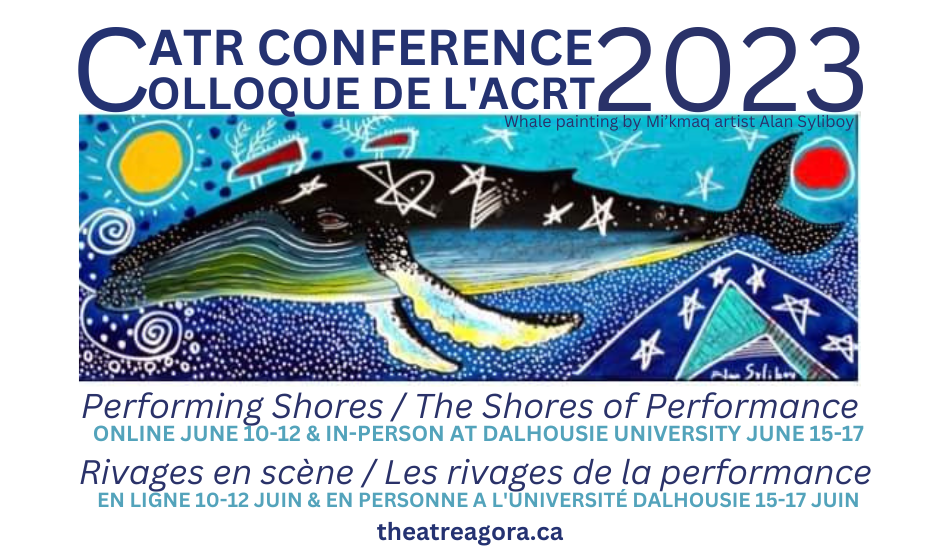
Performing Shores / The Shores of Performance
Online, June 10-12 &
In-Person (Dalhousie University), June 15-17
« Rivages en scène / Les rivages de la performance »
En Ligne, 10-12 Juin &
En Personne (Université Dalhousie), 15-17 Juin
Click here to read a welcome note from CATR President Robin Whittaker.
Conference Programs
Updated full programs are now available for both the online conference (June 10-12) and the in-person conference (June 15-17).
Moderators & Accessibility
See the list of sessions with ASL Interpretation and information about how to share access papers by clicking here.
For a visual guide to navigating the in-person conference, please check out this document.
To follow French-English translation during plenary events, please visit: www.tinyurl.com/CATR2023

Try out the KumoSpace
Connect with colleagues and friends old and new in our Kumospace
Conference Registration

A reminder that all attendees of CATR 2023 (online and in-person) must be members of CATR and must have registered for the conference before attending! Please join/renew your membership with CATR and register for the conference as soon as possible. This will ensure that everything is well set up for you in advance of the conference.
Social Media
Stay connected with us on social media! We’d love to have you join the conversation on CATR’s Twitter and Facebook. We recently created a CATR 2023 conference Instagram account where we’ll be sharing updates, information, and photos too.
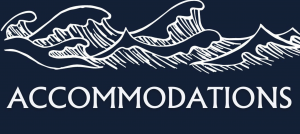
Accommodations in Halifax
Curious about accommodations available in Halifax for the conference? Find out more here.
Instructions to gain access to student discounts:
- Go to stay.dal.ca
- Enter your preferred arrival and departure dates in the menu labelled “Start Your Booking”
- Enter your preferred number of rooms
- Under “Location,” enter “Halifax, Nova Scotia”
- If you would like to book the student discount, enter “student” into the box labelled “Promotion Code”
All available options for your preferred dates should then appear. For students, single rooms are still available at both Howe Hall and Risley Hall (both within 5 minutes’ walk of the conference venue) for $37.50/night, as are double rooms at Howe Hall for $57.75/night for 2 people ($28.86/night per person) and some multi-room suites at LeMarchant Place for those who would like to book as a larger group. Non-students can book single rooms for $59.68/night, or double rooms for $85.25/night.
These prices will remain in place until the conference, as long as room availability lasts. If you are interested, however, please book as soon as you can. Accommodation space is in great demand in the city, and it is possible that the Dalhousie residences may get fully booked before the conference.
Keynote Performance and Talkback, June 10
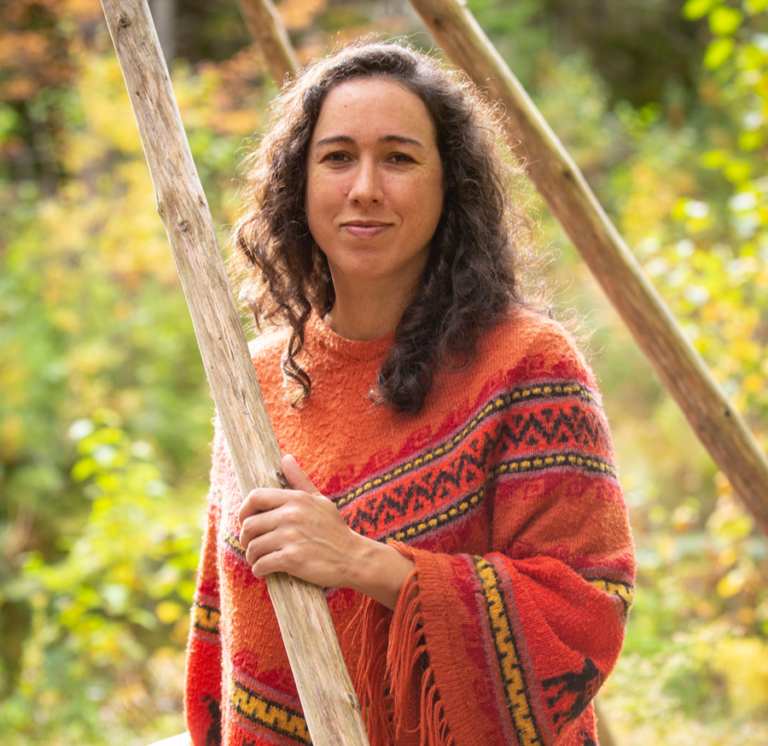
shalan joudry
shalan joudry is a Mi’kmaw poet, storyteller, podcast producer, playwright, actor and singer. She is also an ecologist and cultural interpreter. www.shalanjoudry.com
Sponsored by the McGill Institute for the Study of Canada
Keynote Talk, June 12
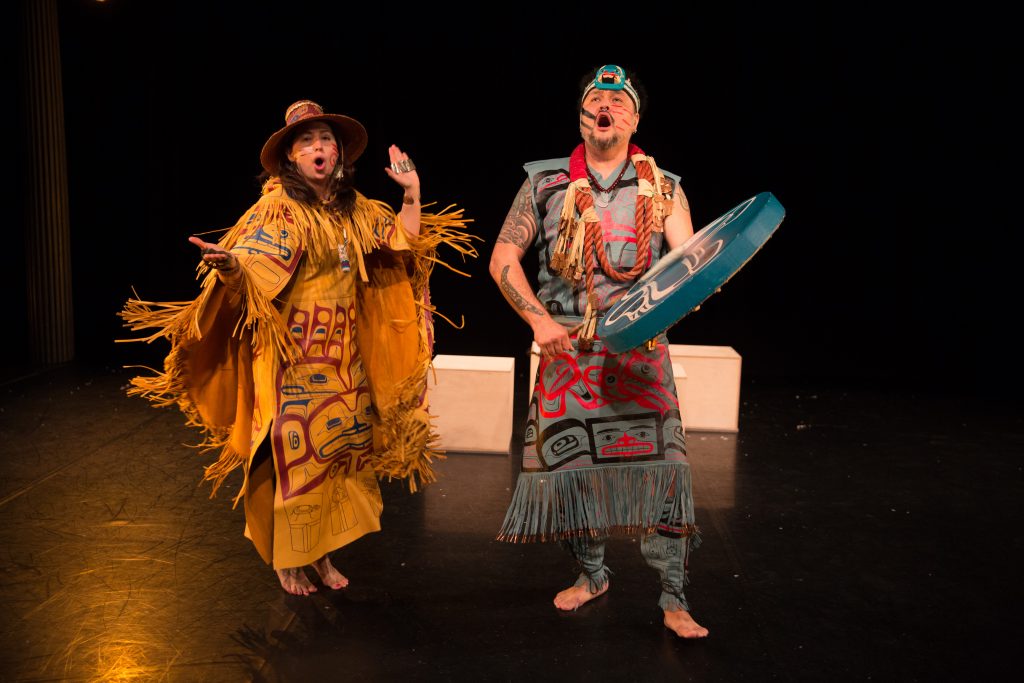
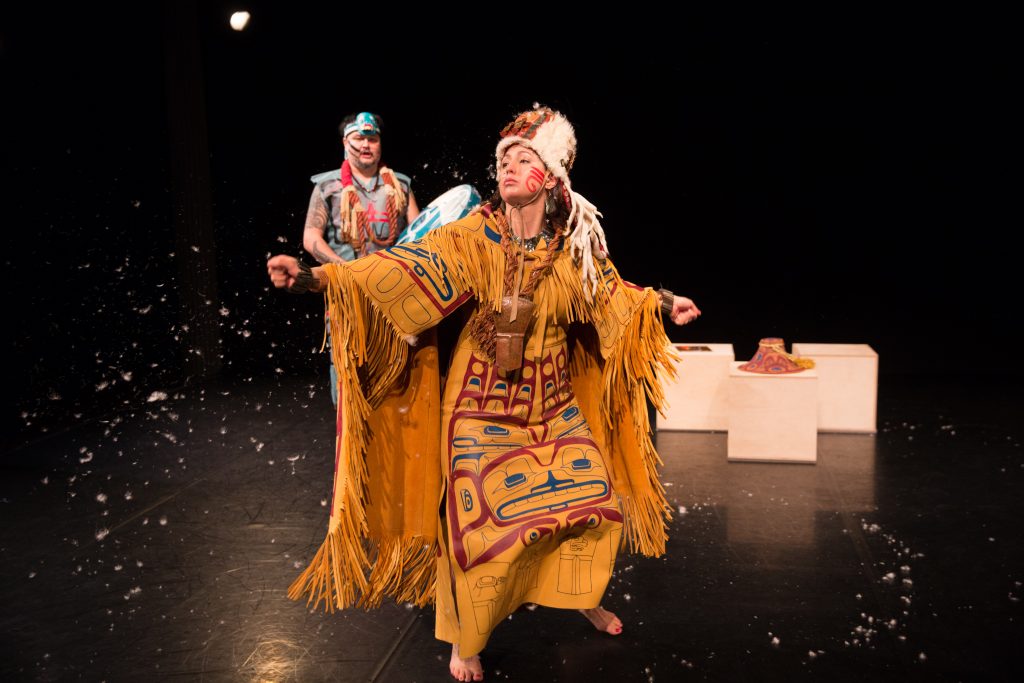
Mike and Mique’l Dangeli
Mike Affiliation: Git Hayetsk Dancers
Mique’l Affiliation: Git Hayetsk Dancers/University of the Fraser Valley
Dancing Sovereignty
In this keynote presentation, Mike and Mique’l Dangeli will show examples of Git Hayetsk Dancers’ performances. They will discuss the history and current practices of Indigenous dance groups in the Pacific Northwest. Drawing on research for her book project, Mique’l will engage with issues around the local and global interpretations of culture, rights, knowledge, and sovereignty, and argue that Indigenous dance group processes are strategic acts of self-determination that are both deeply rooted in protocol, ancient law practices, that address contemporary First Nations issues.
Justification:
Mike Dangeli is of the Nisga’a, Tlingit, Tsetsaut, and Tsimshian Nations. He grew up in his people’s traditional territory in Southeast Alaska and Northern British Columbia. Mike is a renowned artist, carver, singer, composer, dancer, and educator. Mike is in line to be a hereditary chief and has trained under the chiefs and matriarchs since his childhood to become one. He began studying and creating his people’s art at an early age through traditional apprenticeship within his family. For the past 20 years, he and his wife Mique’l Dangeli have shared the leadership of Git Hayetsk, an internationally renowned dance group specializing in ancient and newly created songs and mask dances. Mike’s work is collected and exhibited throughout the world. He has also carved hundreds of masks and headdress use in the performances of Git Hayetsk as well as by many Nations along the Northwest Coast.
Born and raised on the Annette Island Indian Reserve, Dr. Mique’l Dangeli is of the Tsimshian Nation of Metlakatla, Alaska. She is an Assistant Professor in the School of Creative Arts at the University of the Fraser Valley in Abbotsford, British Columbia. Her work focuses on Indigenous visual and performing arts, protocol, cultural resurgence, sovereignty, decolonization, and language revitalization. Mique’l is a dancer, choreographer, educator, curator, and activist. As one of the youngest advanced speakers and teachers of her people’s language, she is dedicated to teaching Sm’algya̱x in community-based and university-accredited classes as well as mentoring educational staff in their process of language acquisition and curriculum development for all ages.
Keynote Address, June 15

Shauntay Grant
“FINDING HER”:
ON WOM❤️NHOOD, BLACKNESS, AND THE SOLO PLAY
Joseph Strug Concert Hall, Dalhousie Arts Centre
Sponsored by the University of Toronto, Centre for Drama, Theatre and Performance Studies
In this performative keynote, playwright and performance artist Shauntay Grant moves between monologue and memory, poetry and prose to examine narratives of Black wom❤️nhood in solo theatre and performance. What happens when core narratives of Blackness conflict with roles Black wom❤️n have been made to assume? How can the poetic process of erasure support an amplifying of Black wom❤️n’s stories and voices in Canadian theatre and performance? Reflecting on her personal experiences writing, witnessing, and embodying Black wom❤️n at centre stage, Grant considers the multifaceted roles Black wom❤️n have played—both knowingly and unwittingly—on the journey to finding, trusting, activating and amplifying their creative voices.
PRESENTER:
Shauntay Grant is a poet, playwright, interdisciplinary artist and children’s author who lives and works in Kjipuktuk, Mi’kma’ki (Halifax, Nova Scotia). As an artist with ancestral ties to the arrival of Black Loyalists, Jamaican Maroons, and Black Refugees to Nova Scotia in the late 1700s and early 1800s, creating art that illuminates African Nova Scotian and African diasporic histories and experiences is a vital part of her work. A former poet laureate for the City of Halifax, she “creates artworks that are engaging and accessible, but also challenging, rigorous, and informed by deep research (The Royal Society of Canada).” Her stage play The Bridge (Playwrights Canada Press, 2021) premiered in 2019 at Neptune Theatre’s Fountain Hall, a co-production between 2b theatre and Neptune in Association with Obsidian Theatre. Set in a rural Black Nova Scotian community, this multilayered story of a family torn apart by betrayal received eleven 2020 Robert Merritt Award nominations, winning four including the prize for Outstanding New Play by a Nova Scotian. Grant’s TYA play Colonial Park toured with Neptune Theatre’s Tour Company in 2023, and her play KK premiered as part of Boca Del Lupo’s Red Phone Project at the 2022 Prismatic Arts Festival. Other recent works include the solo play Beyere (2021), presented as part of Obsidian Theatre’s 21 Black Futures project, and Passing (2021), part of Eastern Front Theatre’s Micro Digitals project.
An associate professor of creative writing at Dalhousie University, Grant holds professional degrees in creative writing, music, and journalism. She is the editor of the forthcoming anthology From The Ashes: Six Solo Plays (Playwrights Canada Press, 2023) which collects groundbreaking solo plays from the past decade by Black Canadian women and womxn. Her own solo play—a collaboration with Zimbabwean mbira player Hope Masike—is in development with 2b theatre. Other work in development includes Identity: A Song Cycle, a collaboration with composer Dinuk Wijeratne and baritone Elliot Madore that explores one’s journey towards embracing multiple and shifting identities; developed by Against The Grain Theatre, Identity will premiere in Fall 2023. Grant is a founding member of the interdisciplinary arts group Erasure Art Collective, and she has exhibited at Canadian galleries and museums including the Dalhousie Art Gallery, the Art Gallery of Ontario, and the Canadian Museum of Immigration at Pier 21. She is the author of nine books for children including My Fade Is Fresh (Penguin, 2022), Sandy Toes (Abrams, 2023), When I Wrap My Hair (HarperCollins, 2024), and Africville (Groundwood, 2018) which won a Marilyn Baillie Picture Book Award and was a finalist for the Governor General’s Literary Awards.
Sponsored by the University of Toronto, Centre for Drama, Theatre and Performance Studies
Plenary Address – June 16th
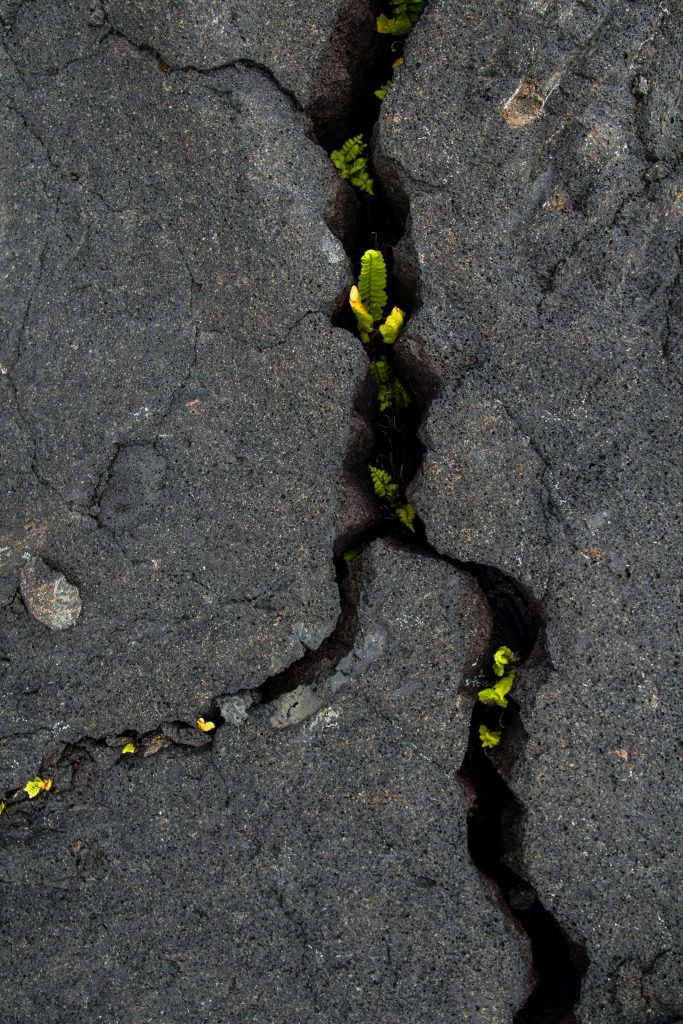
Irresistible Practices
Katrina Dunn (Leader, Course Correction Working Group), Hope McIntyre and Kimberley Skye Richards (Leaders, Environmental Stewardship Working Group)
Irresistible Practices is a shared plenary session profiling the thematic overlap of two of CATR’s Working Groups: Environmental Stewardship in Theatre and Performance Education and Course Correction: Reorienting Approaches to Space in Theatre and Performance. The Environmental Stewardship working group has a mission to re-imagine how we teach, document, and prepare students for sustainable practices in theatre and performance that respond to the unfolding climate crisis. Course Correction builds on the legacy of the spatial turn by defining and exploring new directions for spatial perspectives on theatre and performance, including environmental ethics, feminist and queer spatial theory, and the decolonization of spatial methodologies. With a determination to make change “irresistible,” this plenary exhibits the multifaceted practices of the two groups and offers attendees an opportunity to share in the discussion.
Conference Outline
The shore has been a key site of performance from time immemorial. Mi’kmaw Elder Stephen Augustine describes how, in Mi’kma’ki–the unceded territory of the Mi’kmaq people, where much of this conference will take place—spring gatherings in which the community exchanged songs and stories historically occurred “at the mouth of the river, on the coastline.” Many of Asia’s and Europe’s most celebrated theatres took root on riverbanks. In her 2019 book The Black Shoals: Offshore Formations of Black and Native Studies, Tiffany Lethabo King underlines the decolonizing potential of thinking with shoals and shores, advancing a theoretical approach that “disrupts colonial geographies” and “forecloses settlement and permanent landing on its always shifting and dissolving terrains.” In an age when many shorelines are threatened by climate change, acknowledging their importance to performance cultures seems especially vital. Hence, CATR’s 2023 conference, “Performing Shores / The Shores of Performance,” invites theatre scholars and artist to gather on literal and theoretical shorelines in order to discuss and re-imagine the future shores of theatre, drama, dance, and performance studies in Turtle Island and beyond.
Land Acknowledgement
We would like to acknowledge that the conference takes place in Mi’kma’ki, the ancestral and unceded territory of the Mi’kmaq People. This territory is covered by the “Treaties of Peace and Friendship,” which Mi’kmaq and Wolastoqiyik (Maliseet) Peoples first signed with the British Crown in 1725. The treaties did not deal with surrender of lands and resources but in fact recognized Mi’kmaq and Wolastoqiyik (Maliseet) title and established the rules for what was to be an ongoing relationship between nations.
